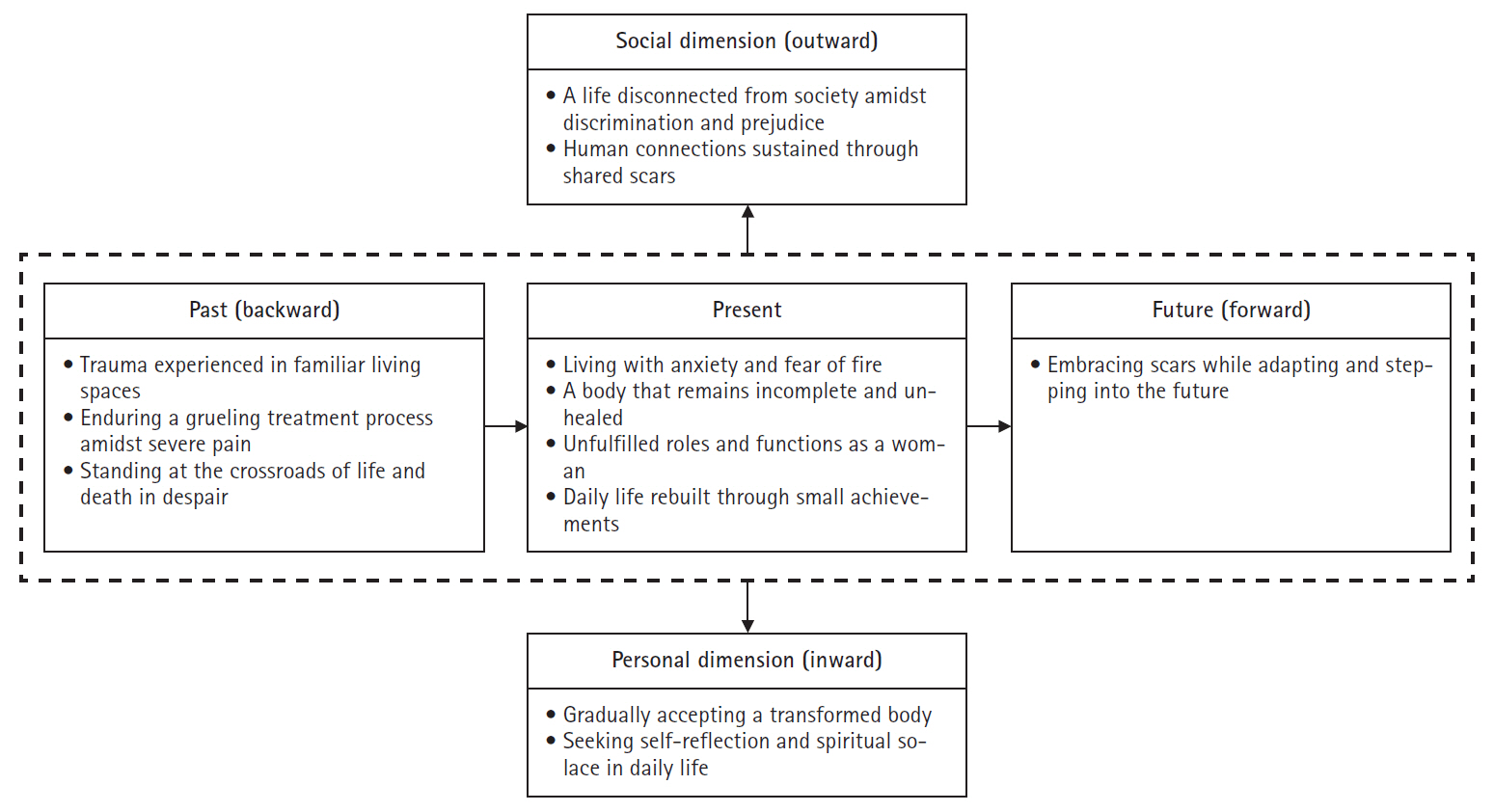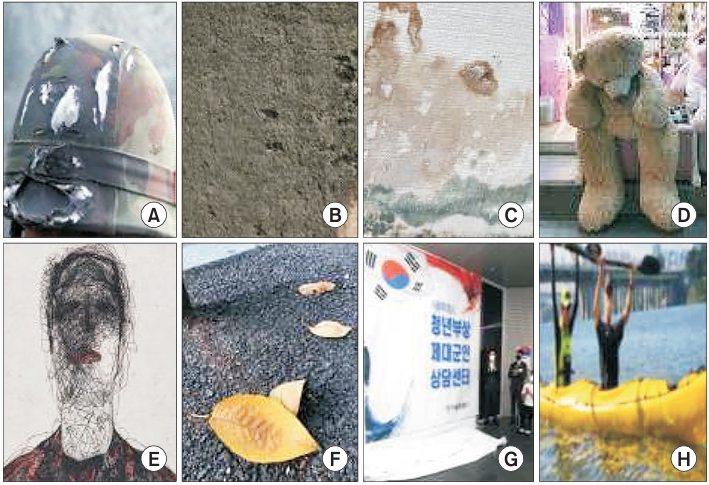Search
- Page Path
- HOME > Search
- Life changes following trauma in female burn survivors: a narrative inquiry
- Riah Kim, Inyoung Choe, Ji-Su Yun, Heeseung Choi
- J Korean Acad Nurs 2025;55(3):425-439. Published online August 1, 2025
- DOI: https://doi.org/10.4040/jkan.25003

-
 Abstract
Abstract
 PDF
PDF ePub
ePub - Purpose
Burn survivors endure repeated exposure to intense pain and face recurring trauma throughout social adaptation. This study explored how female burn survivors construct the meaning of their traumatic experience of a burn accident and the subsequent changes in their lives.
Methods
A qualitative study was conducted using narrative inquiry. Participants were recruited through purposive sampling, and each engaged in three in-depth interviews, resulting in a total of 21 interviews between April 18, 2024, and August 1, 2024. Each interview lasted 90 minutes on average and was conducted in a comfortable location preferred by the participants. The collected data were analyzed through Connelly and Clandinin’s approach.
Results
The participants were seven women with burns on the full body, face-upper limbs, or face-torso. All burns were third- to fourth-degree, and most participants had lived with these injuries for over 10 years. From the significant statements, five themes and 12 subthemes were extracted. The five themes were “unforeseen catastrophe,” “burn scars encroaching upon daily life,” “navigating life as an incomplete woman,” “exclusion from social integration,” and “the meaning of life deepened by suppressed pain.”
Conclusion
Female burn survivors experienced immense hardships following their accidents. However, through their recovery efforts, they found new meaning in life, experienced a renewed sense of being alive, and achieved inner growth and maturity. This study highlights the need for social support and underscores the importance of providing various opportunities and policy assistance for female burn survivors dealing with trauma.
- 1,979 View
- 112 Download

- Exploring Traumatic Experiences and Posttraumatic Growth among Korean Veterans: A Photovoice Study
- Riah Kim, Heese Choi, Minsung Kim
- J Korean Acad Nurs 2024;54(4):519-533. Published online October 14, 2024
- DOI: https://doi.org/10.4040/jkan.24049

-
 Abstract
Abstract
 PDF
PDF ePub
ePub Purpose This study aimed to explore traumatic experiences and posttraumatic growth among Korean veterans.
Methods A qualitative study was conducted using photovoice. Purposive sampling strategies yielded five veterans who had experienced traumatic events. Participants engaged in three discussion sessions between August 5, 2023, and October 28, 2023. The collected data were analyzed using photovoice document analysis and thematic analysis.
Results Study results identified the following themes: ‘The collapse of my life as a result massive trauma,’ ‘Sinking into endless isolation and disconnection,’ ‘The process of finding myself through reflection,’ and ‘My life journey moving forward together.’ Despite the irreversible damage caused by traumatic experiences during military service, the participants continuously reflected on the meaning of their trauma and posttraumatic growth, thereby recovering their authentic selves.
Conclusion Veterans who have experienced traumatic events face severe difficulties, however through their efforts at recovery, they recognize the individuals they are now. This study suggests the need for social support and highlights the necessity of providing various opportunities and policy assistance to traumatized veterans.
- 3,660 View
- 116 Download

- Impact of Parents’ Problem Drinking on Suicidal Ideation of Their University Student Children : The Multiple Mediating Effects of Childhood Trauma, Experiential Avoidance and Depression
- Eun Sook Lee, Eun Ju Bong
- J Korean Acad Nurs 2018;48(5):565-577. Published online January 15, 2018
- DOI: https://doi.org/10.4040/jkan.2018.48.5.565
-
 Abstract
Abstract
 PDF
PDF Abstract Purpose The purpose of this study was to construct and test a hypothetical model about impact of parents’ problem drinking on suicidal ideation of their children who are university students and the multiple mediating effects of childhood trauma, experiential avoidance, and depression based on stress-vulnerability model.
Methods A purposive sample of 400 university students was recruited from three universities in provincial areas and the data were collected between October and November 2016. The collected data were then analyzed using SPSS 20.0 and AMOS 20.0 programs. For data analysis, descriptive statistics, factor analysis, and structural equation modeling were performed. Multiple mediating effects analysis using phantom variable and bootstrapping were implemented to verify the mediating effect of the research model.
Results We found no significant direct effect on depression and suicidal ideation of parents’ problem drinking, but multiple mediating effects of childhood trauma and experiential avoidance between parents’ problem drinking and depression (B=.38,
p =.001). The path from parents’ problem drinking to suicidal ideation was significantly mediated by childhood trauma and depression (B=.02,p =.016) and by childhood trauma, experiential avoidance, and depression (B=.05,p =.011), but experiential avoidance did not have a significant direct effect on suicidal ideation (B=.02,p =.616). Conclusions: Based on the results of this study, it can be suggested that in order to decrease depression and prevent suicide of university students, considering of parents’ problem drinking and childhood trauma, intervention methods that decreased chronic use of experiential avoidance and strengthen acceptance should be developed and made available to them.-
Citations
Citations to this article as recorded by- Unraveling the Complex Pathways: A Conditional Process Analysis of Adverse Childhood Experiences and Internalizing Problems in Late Adolescence
Nooshin Majlesi, Shahram Mohammadkhani, Jafar Hasani, Maryam Moghadasin
Adversity and Resilience Science.2025; 6(4): 579. CrossRef - Psychological Trauma Predicts Obesity in Welsh Secure Mental Health Inpatients
Joseph Lloyd Davies, Daniel Lawrence, Ruth Bagshaw, Andrew Watt, Shane Mills, Catherine Heidi Seage
International Journal of Forensic Mental Health.2024; 23(3): 241. CrossRef - Associations between Suicidal Ideation and Relatives’ Physical and Mental Health among Community Residents: Differences between Family Members and Lineal Consanguinity
Caifeng Li, Zhen Wei, Yifan Wang, Long Sun
International Journal of Environmental Research and Public Health.2022; 19(23): 15997. CrossRef
- Unraveling the Complex Pathways: A Conditional Process Analysis of Adverse Childhood Experiences and Internalizing Problems in Late Adolescence
- 1,575 View
- 21 Download
- 3 Crossref

 KSNS
KSNS
 E-SUBMISSION
E-SUBMISSION

 First
First Prev
Prev


